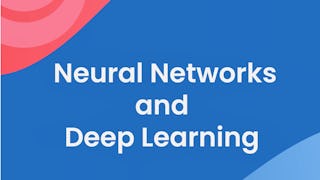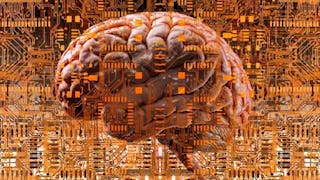- Browse
- Deep Learning
Deep Learning Courses
Deep learning courses can help you learn neural networks, convolutional networks, and recurrent networks, along with their applications in image recognition and natural language processing. You can build skills in model training, hyperparameter tuning, and performance evaluation, which are crucial for developing effective AI solutions. Many courses introduce tools like TensorFlow and PyTorch, allowing you to implement algorithms and optimize models, making your learning experience hands-on and relevant to current industry practices.
Popular Deep Learning Courses and Certifications
 Status: Free TrialFree TrialD
Status: Free TrialFree TrialDDeepLearning.AI
Skills you'll gain: Convolutional Neural Networks, Recurrent Neural Networks (RNNs), Computer Vision, Transfer Learning, Deep Learning, Image Analysis, Hugging Face, Natural Language Processing, Artificial Neural Networks, Artificial Intelligence and Machine Learning (AI/ML), Tensorflow, Applied Machine Learning, Embeddings, Supervised Learning, Keras (Neural Network Library), Machine Learning, Debugging, Performance Tuning, PyTorch (Machine Learning Library), Data Preprocessing
Build toward a degree
4.8·Rating, 4.8 out of 5 stars147K reviewsIntermediate · Specialization · 3 - 6 Months
 Status: Free TrialFree TrialD
Status: Free TrialFree TrialDDeepLearning.AI
Skills you'll gain: Deep Learning, Artificial Neural Networks, Convolutional Neural Networks, Applied Machine Learning, Supervised Learning, Recurrent Neural Networks (RNNs), Python Programming, Linear Algebra, Calculus
4.9·Rating, 4.9 out of 5 stars124K reviewsIntermediate · Course · 1 - 4 Weeks
 Status: Free TrialFree TrialStatus: AI skillsAI skills
Status: Free TrialFree TrialStatus: AI skillsAI skillsSkills you'll gain: Transfer Learning, PyTorch (Machine Learning Library), Model Evaluation, Vision Transformer (ViT), Keras (Neural Network Library), Deep Learning, Reinforcement Learning, Convolutional Neural Networks, Unsupervised Learning, Autoencoders, Artificial Neural Networks, Recurrent Neural Networks (RNNs), Generative Adversarial Networks (GANs), Logistic Regression, Tensorflow, Artificial Intelligence and Machine Learning (AI/ML), Image Analysis, Data Preprocessing, Model Deployment, Computer Vision
4.5·Rating, 4.5 out of 5 stars4.1K reviewsIntermediate · Professional Certificate · 3 - 6 Months
 Status: Free TrialFree TrialDS
Status: Free TrialFree TrialDSMultiple educators
Skills you'll gain: Unsupervised Learning, Supervised Learning, Transfer Learning, Machine Learning, Jupyter, Applied Machine Learning, Data Ethics, Decision Tree Learning, Model Evaluation, Tensorflow, Scikit Learn (Machine Learning Library), NumPy, Predictive Modeling, Deep Learning, Artificial Intelligence, Classification Algorithms, Reinforcement Learning, Random Forest Algorithm, Feature Engineering, Data Preprocessing
4.9·Rating, 4.9 out of 5 stars38K reviewsBeginner · Specialization · 1 - 3 Months
 Status: Free TrialFree Trial
Status: Free TrialFree TrialSkills you'll gain: Keras (Neural Network Library), Deep Learning, Transfer Learning, Artificial Neural Networks, Recurrent Neural Networks (RNNs), Convolutional Neural Networks, Image Analysis, Classification And Regression Tree (CART), Regression Analysis, Network Architecture, Natural Language Processing, Machine Learning, Model Evaluation
4.7·Rating, 4.7 out of 5 stars2.1K reviewsIntermediate · Course · 1 - 3 Months
 Status: Free TrialFree Trial
Status: Free TrialFree TrialSkills you'll gain: PyTorch (Machine Learning Library), Deep Learning, Convolutional Neural Networks, Artificial Neural Networks, Artificial Intelligence and Machine Learning (AI/ML), Machine Learning Methods, Applied Machine Learning, Supervised Learning, Logistic Regression, Classification Algorithms, Model Evaluation
4.5·Rating, 4.5 out of 5 stars78 reviewsIntermediate · Course · 1 - 3 Months
What brings you to Coursera today?
 Status: NewNewStatus: Free TrialFree TrialStatus: AI skillsAI skillsD
Status: NewNewStatus: Free TrialFree TrialStatus: AI skillsAI skillsDDeepLearning.AI
Skills you'll gain: PyTorch (Machine Learning Library), Model Deployment, Convolutional Neural Networks, Transfer Learning, Generative AI, Deep Learning, Image Analysis, MLOps (Machine Learning Operations), Data Pipelines, Embeddings, Artificial Neural Networks, Model Evaluation, Data Preprocessing, Software Visualization, Computer Vision, Natural Language Processing, Machine Learning
4.8·Rating, 4.8 out of 5 stars53 reviewsIntermediate · Professional Certificate · 1 - 3 Months
 Status: Free TrialFree TrialI
Status: Free TrialFree TrialIImperial College London
Skills you'll gain: Tensorflow, Recurrent Neural Networks (RNNs), Autoencoders, Generative Model Architectures, Data Pipelines, Keras (Neural Network Library), Model Evaluation, Deep Learning, Image Analysis, Transfer Learning, Convolutional Neural Networks, Applied Machine Learning, Bayesian Statistics, Supervised Learning, Natural Language Processing, Computer Vision, Model Deployment, Artificial Neural Networks, Data Preprocessing, Probability Distribution
4.8·Rating, 4.8 out of 5 stars719 reviewsIntermediate · Specialization · 3 - 6 Months
 Status: NewNewStatus: Free TrialFree Trial
Status: NewNewStatus: Free TrialFree TrialSkills you'll gain: Model Evaluation, Convolutional Neural Networks, Data Preprocessing, Keras (Neural Network Library), Image Analysis, Deep Learning, Tensorflow, Computer Vision, Artificial Neural Networks, Recurrent Neural Networks (RNNs), Data Manipulation, Data Transformation, Financial Forecasting, Data Visualization, Time Series Analysis and Forecasting, Exploratory Data Analysis, Python Programming, Customer Analysis, Applied Machine Learning, Cloud Computing
4.8·Rating, 4.8 out of 5 stars20 reviewsBeginner · Specialization · 1 - 3 Months
 Status: NewNewStatus: Free TrialFree TrialP
Status: NewNewStatus: Free TrialFree TrialPPearson
Skills you'll gain: Large Language Modeling, Deep Learning, Prompt Engineering, Image Analysis, Model Deployment, Recurrent Neural Networks (RNNs), PyTorch (Machine Learning Library), Convolutional Neural Networks, Tensorflow, Vision Transformer (ViT), LLM Application, Transfer Learning, Computer Vision, Responsible AI, Natural Language Processing, Embeddings, Keras (Neural Network Library), Generative AI, Artificial Neural Networks, Multimodal Prompts
Intermediate · Specialization · 1 - 4 Weeks
 Status: Free TrialFree TrialM
Status: Free TrialFree TrialMMathWorks
Skills you'll gain: Model Evaluation, Computer Vision, Model Deployment, Anomaly Detection, Convolutional Neural Networks, Image Analysis, Transfer Learning, Matlab, Deep Learning, Artificial Neural Networks, Applied Machine Learning, PyTorch (Machine Learning Library), Data Preprocessing, Classification Algorithms, Data Visualization, Data Synthesis, Performance Tuning, Data Analysis
4.9·Rating, 4.9 out of 5 stars34 reviewsBeginner · Specialization · 1 - 3 Months
 Status: Free TrialFree Trial
Status: Free TrialFree TrialSkills you'll gain: Prompt Engineering, Apache Spark, Large Language Modeling, Transfer Learning, PyTorch (Machine Learning Library), Model Evaluation, Computer Vision, Retrieval-Augmented Generation, Unsupervised Learning, Generative Model Architectures, Generative AI, PySpark, Vision Transformer (ViT), Keras (Neural Network Library), LLM Application, Supervised Learning, Vector Databases, Machine Learning, Python Programming, Data Science
Build toward a degree
4.6·Rating, 4.6 out of 5 stars22K reviewsIntermediate · Professional Certificate · 3 - 6 Months
Searches related to deep learning
In summary, here are 10 of our most popular deep learning courses
- Deep Learning: DeepLearning.AI
- Neural Networks and Deep Learning: DeepLearning.AI
- IBM Deep Learning with PyTorch, Keras and Tensorflow: IBM
- Machine Learning: DeepLearning.AI
- Introduction to Deep Learning & Neural Networks with Keras: IBM
- Deep Learning with PyTorch: IBM
- PyTorch for Deep Learning: DeepLearning.AI
- TensorFlow 2 for Deep Learning: Imperial College London
- Deep Learning with Python: CNN, ANN & RNN: EDUCBA
- Learning Deep Learning: Pearson
Frequently Asked Questions about Deep Learning
Deep learning is a subset of machine learning that utilizes neural networks with many layers (hence the term 'deep') to analyze various forms of data. It is important because it enables computers to perform tasks that typically require human intelligence, such as image recognition, natural language processing, and decision-making. As technology continues to evolve, deep learning is becoming increasingly integral in various industries, driving innovations in automation, healthcare, finance, and more.
Pursuing a career in deep learning can open doors to various job opportunities. Some common roles include deep learning engineer, data scientist, machine learning engineer, AI researcher, and computer vision engineer. These positions often involve designing and implementing deep learning models, analyzing data, and developing algorithms that can learn from and make predictions based on data.
To succeed in deep learning, you should develop a strong foundation in several key skills. These include programming languages such as Python, understanding of machine learning concepts, proficiency in using deep learning frameworks like TensorFlow and PyTorch, and knowledge of mathematics, particularly linear algebra and calculus. Familiarity with data preprocessing and model evaluation techniques is also beneficial.
There are numerous online courses available for those interested in deep learning. Some of the best options include the Deep Learning Specialization and the IBM Deep Learning with PyTorch, Keras and Tensorflow Professional Certificate. These courses provide comprehensive training and hands-on experience in deep learning techniques and applications.
Yes. You can start learning deep learning on Coursera for free in two ways:
- Preview the first module of many deep learning courses at no cost. This includes video lessons, readings, graded assignments, and Coursera Coach (where available).
- Start a 7-day free trial for Specializations or Coursera Plus. This gives you full access to all course content across eligible programs within the timeframe of your trial.
If you want to keep learning, earn a certificate in deep learning, or unlock full course access after the preview or trial, you can upgrade or apply for financial aid.
To learn deep learning effectively, start by building a strong foundation in programming and mathematics. Enroll in introductory courses to understand the basics of machine learning and neural networks. Gradually progress to more advanced topics and practical applications by working on projects. Engaging with online communities and forums can also provide support and enhance your learning experience.
Deep learning courses typically cover a range of topics, including neural network architectures, convolutional neural networks (CNNs), recurrent neural networks (RNNs), natural language processing, and reinforcement learning. Additionally, courses may explore practical applications in fields such as computer vision, healthcare, and finance, providing learners with a well-rounded understanding of how deep learning can be applied in real-world scenarios.
For training and upskilling employees in deep learning, specialized courses such as the AI ML with Deep Learning and Supervised Models Specialization and the Deep Learning for Healthcare Specialization can be particularly beneficial. These programs focus on practical skills and applications, making them suitable for workforce development.










